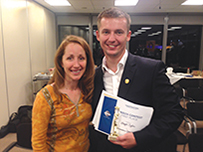 Svetlana Rakhimova, DTM (left), and Assyl Boizhanova, DTM, became lasting friends through a reciprocal virtual mentorship in the online international club Witty Birds. During a pre-pandemic trip together, Rakhimova, from England, and Boizhanova, from Kazakhstan, took their Toastmasters spirit to Samarkand, Uzbekistan.
Svetlana Rakhimova, DTM (left), and Assyl Boizhanova, DTM, became lasting friends through a reciprocal virtual mentorship in the online international club Witty Birds. During a pre-pandemic trip together, Rakhimova, from England, and Boizhanova, from Kazakhstan, took their Toastmasters spirit to Samarkand, Uzbekistan.When Misako Yoke became Club President of Buddies, an online Toastmasters club, there were six members. Yoke focused on recruitment, and the club grew. With so many new Toastmasters, she needed help onboarding them. One of those helpers was online mentor Tricia Grow, DTM, a member of both Carlisle Community Toastmasters, in Dillsburg, Pennsylvania, and CompetitiveCommunicators.com, an online global club.
“Tricia has been mentoring Toastmasters all over the world,” says Yoke. In the Buddies club alone, members live worldwide, including China, Japan, India, Norway, Pakistan, Sri Lanka, and the United States. For more than a year, Grow mentored several of Buddies’ new members. She also served as an on-call mentor before the weekly meetings for people who had questions about their roles or needed support.
Mentoring is a time-honored practice in Toastmasters. Through the years, members from the local level to International Presidents have time and again attributed part of their successes to mentors. Clubs regularly emphasize the role of mentoring, and it is a Level 2 component in every Pathways path. Now, in the online environment, it’s more valuable than ever.
Online Mentoring Benefits
The ability to connect with anyone, in any location, is a major benefit of online mentoring. “Being able to click a button to access a club without having to go anywhere was attractive to me as I am disabled and dislike having to drive great distances,” says Grow. “It is also great to be able to immerse myself in another culture.”
Svetlana Rakhimova, DTM, agrees. She founded two online clubs—Witty Storytellers Online and Witty Birds—with global memberships. Members prize mentoring relationships; Rakhimova has been a mentor and a mentee.
“I believe online mentoring is more rewarding and convenient than the traditional,” says Rakhimova. For rewards, she cites greater cultural interactions and opportunities to help people when there are language and skill gaps. There’s also satisfaction in showing people the possibilities of body language and performance within the online environment.
Conveniences include time and money saved because no travel is involved. For online club members, particularly those in remote areas or places far from traditional clubs, a virtual connection might be their main or only mentoring option.
It can also connect people beyond geographic boundaries. Through recommendations, Yoke also recruited two online club coaches—one from the Caribbean and another from northern Canada—to help grow Buddies. “There was quite a variety of clothing in the online meeting room!” says Yoke.
Other benefits include those gained from any kind of mentoring: growth, increased engagement, more in-depth feedback, and shorter club learning curves.
Mentors benefit too. Mentees can spark mentors’ creativity, re-energize them, teach them something new, and increase their engagement. And when people are engaged, clubs encounter less attrition.
Growth of Online Mentoring
New and improved communication options allow people to connect more easily. As technology is more readily available, easier to use, and sometimes free, collaborating online has grown in familiarity and acceptance.
The growth of online clubs has increased opportunities for virtual mentoring. In March 2016, Toastmasters International changed its policies to permit online clubs. After six months, three online clubs chartered, five were in the pipeline, and more than 190 traditional, “brick and mortar” clubs incorporated online participation into meetings. Of course, due to COVID-19, some 83% of Toastmasters clubs are meeting online anyway, for the time being. This makes virtual mentoring an even more popular, accessible, and unique opportunity.
A Myriad of Mentoring Types
The traditional mentoring arrangement is a one-on-one relationship between a mentor and mentee. Individuals can also be mentored in peer-to-peer engagements where there are no permanent relationships. “It’s still one person mentoring another person, but there are as many pairs as there are skills and needs for them,” says Rakhimova. Or, like the Buddies club, there can be an on-call mentor for whomever has a need at the time.
Witty Storytellers Online and Witty Birds offer skill banks to connect mentors and mentees. Mentors can offer up to three public speaking skills. Any member who wants to strengthen a specific skill can reach out for help.
Mentoring is a time-honored practice in Toastmasters. Now, in the online environment, it's more valuable than ever.
“People feel more empowered when they can offer at least one skill they feel confident enough in to serve as role models and mentors,” says Rakhimova. “The same is true about mentees. Their vulnerability becomes a reason for useful communication. And nobody is stuck with a mentor who is no longer relevant or was not a great match.”
Online mentoring can happen in groups too. For clubs that offer mentor-mentee clusters, if multiple mentees want to talk with the same mentor, particularly about the same topic, it can turn into a group session.
Finding an Online Mentor
The right mentor-mentee fit is essential. Mentees should focus on what skills and goals they’re seeking and who can offer relevant guidance. Communication style and personality are also important. For online mentoring specifically, there are practical issues, like time zones, to keep in mind. Both mentor and mentee should establish clear expectations, goals, and the duration of the official relationship upfront.
Start with your own club. Some clubs, like Witty Birds, have a mentor coordinator. You can also contact District-level leadership through your club’s officers to find someone with the background you’re seeking. Attending Toastmasters events beyond your club can expose you to more members who could be potential mentors.
Online Dynamics
With online mentoring, the concept of “meetings” can become blurred. For example, emails can be even more important and substantive. Mentors and mentees should discuss communication options, and decide what constitutes a meeting and will work best.
There should be agreement about how often to meet and what type of responses are expected. Check in and confirm what’s working. See if adjustments should be made due to changing circumstances, unrealistic expectations, or unanticipated issues. It’s also essential to be patient and flexible, particularly with technology issues, and be mindful of tone.
Yoke said Buddies members always felt Tricia Grow’s warmth and openness come through the screen. “She made us feel embraced and forget we were thousands of miles away from each other,” says Yoke.
Grow’s dedication and energy were major factors in her ability to convey her personality online. She also positioned her camera at just the right height to look directly into the lens, as if she were looking into the club members’ eyes.
“We felt like we were getting her undivided attention,” says Yoke. “Her nodding, pausing, and tilting her head made us feel like she was at the other side of the kitchen table, talking one-on-one.”
Don’t let geography limit you. If you want a mentor, find the best one for you, whether that person is next door or halfway around the world.
Jennifer L. Blanck, DTM , has more than 25 years of career development and advising experience. She is a member of 5-Star Toastmasters Club in Arlington, Virginia, and AAMC Toastmasters in Washington, D.C., as well as a regular contributor to the Toastmaster magazine. Learn more at jenniferlblanck.com.
Related Articles

Mentorship
Online Mentoring

Mentorship
The Meaning of Good Mentoring

Club Experience



 Previous
Previous
 Previous Article
Previous Article